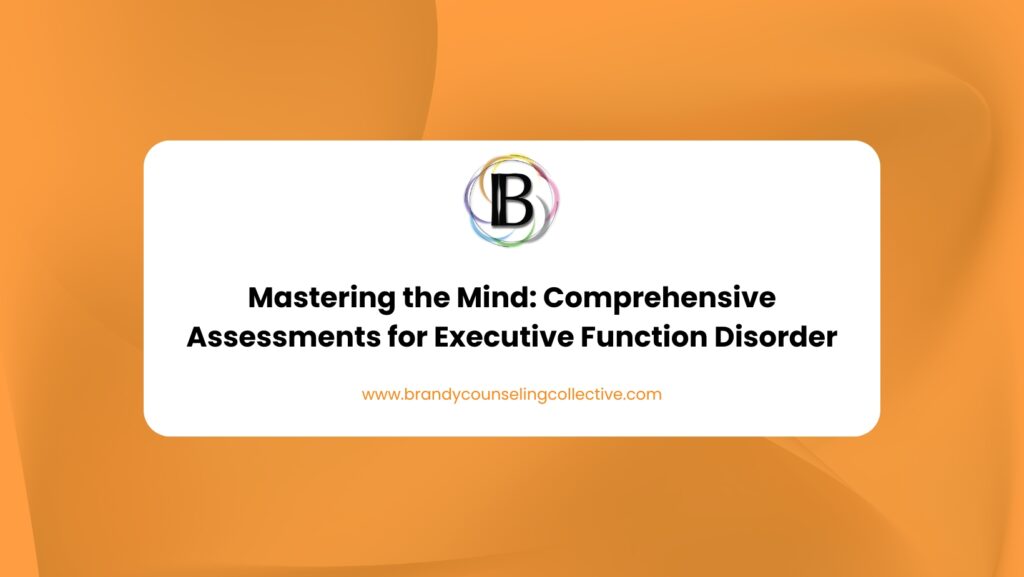Executive Function Disorder (EFD) is a condition that affects a set of cognitive processes essential for managing oneself and one’s resources to achieve a goal. These processes include skills such as working memory, flexible thinking, sustained attention, and self-control. Individuals with EFD often struggle with planning, organizing, strategizing, paying attention to and remembering details, and managing time and space. Comprehensive assessments for Executive Function Disorder are crucial for accurately diagnosing the condition and developing effective intervention strategies.
Understanding Executive Function Disorder
Executive functions are cognitive processes that enable individuals to plan, focus attention, remember instructions, and juggle multiple tasks successfully. When these functions are impaired, it can significantly affect daily life, academic performance, and professional success. EFD can manifest in various ways, including difficulties with:
- Time Management: Struggling to allocate appropriate time for tasks and often missing deadlines.
- Organization: Difficulty keeping track of personal items, tasks, and responsibilities.
- Task Initiation: Procrastination or trouble starting tasks without external prompts.
- Working Memory: Trouble holding information in mind while using it to complete a task.
- Flexible Thinking: Difficulty adapting to new situations or shifting perspectives.
- Self-Monitoring: Challenges in keeping track of one’s own progress on tasks.
- Emotion Regulation: Difficulty managing emotions, which can lead to frustration or outbursts.
Importance of Comprehensive Assessments
Accurate diagnosis of EFD is crucial for effective treatment and managing executive function difficulties. Comprehensive assessments ensure that the executive function diagnosis is based on a thorough understanding of the individual’s cognitive function and developmental history. Here are some reasons why comprehensive assessments are vital:
Tailored Interventions
Each individual with EFD is unique, with distinct strengths and challenges. Comprehensive assessments provide detailed information that helps in developing personalized intervention plans, maximizing the effectiveness of treatments and supports.
Identification of Co-occurring Conditions
EFD often co-occurs with other conditions such as ADHD, anxiety, depression, learning disabilities, and brain injury. Comprehensive assessments help identify these co-occurring conditions, ensuring that all aspects of the individual’s needs are addressed.
Long-term Planning
Understanding the full scope of an individual’s executive function challenges aids in long-term planning. This includes educational accommodations, workplace adjustments, and therapeutic interventions that can evolve as the individual grows and their needs change.
Components of a Comprehensive Executive Function Assessment
A comprehensive assessment for EFD involves multiple steps and tools to gather detailed information about the individual’s cognitive abilities, behavior, and developmental history. Here are the key components of a thorough EFD assessment:
1. Clinical Interviews
Clinical interviews with the individual and their family members are foundational to the assessment process. These interviews help gather information about the individual’s developmental history, family history, and current functioning. They provide insight into how executive function difficulties manifest across different settings and over time.
2. Behavior Rating Scales
Behavior rating scales are standardized tools used to quantify the severity and frequency of executive function challenges. These scales are completed by parents, teachers, and sometimes the individuals themselves. Commonly used behavior rating scales include:
- Behavior Rating Inventory of Executive Function (BRIEF): This scale assesses various aspects of executive function in children, adolescents, and adults.
- Conners’ Adult ADHD Rating Scales (CAARS): This scale evaluates executive function difficulties in adults with ADHD.
3. Observational Assessments
Observational assessments involve directly observing the individual’s behavior in various settings, such as home, school, or the workplace. These observations help professionals understand how executive function difficulties impact daily functioning and identify specific environmental triggers or supports.
4. Cognitive and Neuropsychological Testing
Cognitive and neuropsychological testing evaluates the individual’s cognitive abilities, such as working memory, attention, processing speed, and problem-solving skills. These tests help identify specific areas of cognitive strength and weakness, guiding the development of targeted interventions. Tools such as the Trail Making Test are often used to assess cognitive flexibility and attention.
5. Educational and Academic Assessments
For children and adolescents, educational assessments are crucial for understanding how EFD impacts academic performance. These assessments evaluate skills such as reading, writing, mathematics, and overall learning potential. They help in developing appropriate educational accommodations and support plans.
6. Medical and Psychological Evaluations
A comprehensive EFD assessment often includes medical and psychological evaluations to rule out other conditions that might mimic or exacerbate executive function difficulties. These evaluations can include physical examinations, medical history reviews, and assessments for co-occurring psychological conditions like anxiety or depression, as well as other mental health conditions.
7. Self-Report Questionnaires
Self-report questionnaires allow individuals to describe their own experiences and perceptions of their executive function difficulties. These questionnaires provide valuable insight into how EFD affects their day-to-day life and well-being.
The Executive Function Assessment Process
A comprehensive EFD assessment involves a multidisciplinary team of professionals, including psychologists, neuropsychologists, educators, and medical doctors. The assessment process typically follows these steps:
Step 1: Initial Consultation
The assessment process begins with an initial consultation with a healthcare provider or specialist. During this meeting, parents, caregivers, or the individual share their concerns and observations about behavior and development.
Step 2: Gathering Information
The healthcare provider gathers detailed information through clinical interviews, behavior rating scales, and questionnaires. This information helps create a comprehensive picture of the individual’s executive function challenges.
Step 3: Conducting Assessments
The multidisciplinary team conducts a series of assessments, including cognitive and neuropsychological testing, observational assessments, and educational evaluations. Each team member evaluates the individual in their area of expertise, contributing to a holistic understanding of the individual’s strengths and challenges.
Step 4: Feedback and Diagnosis
After completing the assessments, the team meets to discuss their findings and make a diagnosis. They then provide feedback to the individual and their family, explaining the results and the implications for the individual’s development and functioning. This feedback includes detailed discussions about the executive function diagnosis and the potential treatment options.
Step 5: Developing an Intervention Plan
Based on the assessment results, the team develops an individualized intervention plan tailored to the individual’s needs. This plan may include recommendations for therapies, educational supports, and other interventions to address specific challenges.
Benefits of Comprehensive EFD Assessments
Comprehensive EFD assessments provide numerous benefits for individuals and their families:
Accurate Diagnosis
Accurate diagnosis is essential for accessing appropriate services and supports. A thorough assessment ensures that the diagnosis is based on a comprehensive understanding of the individual’s cognitive abilities and development.
Personalized Interventions
Comprehensive assessments provide detailed information that helps create personalized intervention plans, maximizing the effectiveness of treatments and supports.
Improved Outcomes
Early and accurate diagnosis, combined with appropriate supports and interventions, can significantly improve outcomes for individuals with EFD. Comprehensive assessments enable timely and effective intervention, enhancing the individual’s quality of life.
Ongoing Support
Assessment results guide the development of ongoing support plans, including educational accommodations, workplace adjustments, and therapeutic interventions. This ensures that the individual’s needs are continuously met as they grow and develop.
Unlock Potential with Brandy Counseling Collective: Comprehensive Assessments for Executive Function Disorder
Mastering the mind through comprehensive assessments for Executive Function Disorder (EFD) is crucial for unlocking the potential of those affected by this condition. At Brandy Counseling Collective, we provide detailed assessments that uncover each individual’s unique strengths and challenges, enabling the development of tailored intervention plans to significantly improve outcomes.
If you have concerns about EFD in yourself or a loved one, seeking a comprehensive assessment with us is a critical first step towards accessing the support and resources needed to thrive. Our accurate diagnoses, personalized interventions, and ongoing support are key to helping individuals with EFD lead fulfilling and successful lives.
The benefits of managing executive function difficulties through our comprehensive assessments are profound, setting the foundation for effective diagnosis and treatment that can transform everyday life. Whether dealing with sustained attention issues or emotional control challenges, Brandy Counseling Collective is here to help pave the way for better mental health and an improved quality of life.


